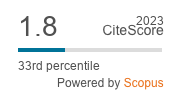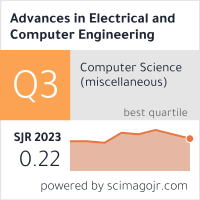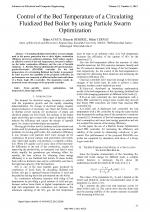| 2/2012 - 5 |
Control of the Bed Temperature of a Circulating Fluidized Bed Boiler by using Particle Swarm OptimizationAYGUN, H. |
| View the paper record and citations in |
| Click to see author's profile in |
| Download PDF |
Author keywords
particle swarm optimization, bed temperature, fuzzy logic, boiler
References keywords
swarm(25), optimization(21), control(20), controller(13), systems(11), fuzzy(9), evolutionary(7), computation(7), system(6), fluidized(6)
Blue keywords are present in both the references section and the paper title.
About this article
Date of Publication: 2012-05-30
Volume 12, Issue 2, Year 2012, On page(s): 27 - 32
ISSN: 1582-7445, e-ISSN: 1844-7600
Digital Object Identifier: 10.4316/AECE.2012.02005
Web of Science Accession Number: 000305608000005
SCOPUS ID: 84865280645
Abstract
Circulating fluidized bed boilers are increasingly used in the power generation due to their higher combustion efficiency and lower pollutant emissions. Such boilers require an effective control of the bed temperature, because it influences the boiler combustion efficiency and the rate of harmful emissions. A Particle-Swarm-Optimization-Proportional-Integrative-Derivative (PSO-PID) controller for the bed temperature of a circulating fluidized bed boiler is presented. In order to prove the capability of the proposed controller, its performances are compared at different boiler loads with those of a Fuzzy Logic (FL) controller. The simulation results demonstrate some advantages of the proposed controller. |
| References | | | Cited By «-- Click to see who has cited this paper |
| [1] B. Lixia, Z. Junxia, F. Song, Modeling and simulating of bed temperature control of circulating fluidized boiler, Journal of North China Electric Power University, vol. 30 n. 1, January 2003, pp. 53-56.
[2] P. Fu, X. Yu, H. Wang, Research on fuzzy control algorithm for bed temperature control of circulating fluidized bed boiler, Proceedings of the Forth International Conference on Machine Learning and Cybernetics, August 18-21, 2005, Guangzhou, China. [CrossRef] [3] A. A. Jalali, A. Hadavand, Bed temperature control of a circulating fluidized bed combustion system using H algorithm, Proceedings of the International Conference on Control, Automation and Systems, October 17-20, 2007, Seoul, South Korea. [CrossRef] [SCOPUS Times Cited 9] [4] M. Clerc, The swarm and the queen: towards a deterministic and adaptive particle swarm optimization, Proceedings of the Congress on Evolutionary Computation, July 6-9, 1999, Washington, DC, USA [PubMed] [5] J. Kennedy, R. Eberhart, Particle swarm optimization, Proceedings of the IEEE International Conference on Neural Networks, November 27-December 1, 1995, Perth WA, Australia [CrossRef] [Web of Science Times Cited 32075] [6] J. Chen, Z. Ren, X. Fan, Particle swarm optimization with adaptive mutation and its application research in tuning of PID parameters, Proceedings of the 1st International Symposium on Systems and Control in Aerospace and Astronautics, January 2006, Harbin, China, pp. 19-21 [CrossRef] [7] Y. Shi, R. C. Eberhart, Emprical study of particle swarm optimization, Proceedings of the Congress on Evolutionary Computation, July 6-9, 1999, Washington DC, USA [PubMed] [8] H. Gozde, M. C. Taplamacioglu, I. Kocaarslan, E. Cam, Particle swarm optimization based load frequency control in a single area power system, Scientific Bulletin of Electronics and Computers Science, University of Pitesti, Romania, vol. 2 n. 8, 2008, pp. 106-110. [9] Z.-L. Gaing, A particle swarm optimization approach for optimum design of PID controller in AVR system, IEEE Transactions on Energy Conversion, vol. 19 n. 2, June 2004, pp. 384-391 [CrossRef] [Web of Science Times Cited 1115] [SCOPUS Times Cited 1546] [10] J. Wang, Z. Zhai, Y. Jing, C. Zhang, Particle swarm optimization for redundant building cooling heating and power systems, Applied Energy, vol. 87, n. 12, 2010, pp. 3668-3679 [CrossRef] [Web of Science Times Cited 254] [SCOPUS Times Cited 297] [11] H. Aygun, H. Demirel, Comparison of PSO-PID, FLC and PID in a circulating fluidized bed boiler, Proceedings of the 7th International Conference on Electrical and Electronics Engineering (ELECO'11), December 1-4, 2011, Bursa, Turkey. [12] H. Aygun, Control of the bed temperature of a fluidized bed boiler by a Particle Swarm Optimization based PID (PSO-PID) controller, (in Turkish), M.S. Thesis, Electrical and Electronics Eng., 2011, Karabuk University, Karabuk, Turkey. [13] A. Hadavand, A. A. Jalali, P. Famouri, An innovative bed temperature-oriented modelling and robust control of a circulating fluidized bed combustor, Chemical Engineering Journal, vol. 140, 2008, pp. 497-508 [CrossRef] [Web of Science Times Cited 21] [SCOPUS Times Cited 30] [14] L. Changliang, S. Xiaojiao, Electromagnetism-like mechanism particle swarm optimization and application in thermal process model identification, Proceedings of the 2010 Chinese Control and Decision Conference (CCDC), 2010, pp.: 2966 - 2970 [CrossRef] [Web of Science Times Cited 2] [SCOPUS Times Cited 4] [15] Chengxi Ma, Lin Qian, Ling Wang, M. I. Menhas, Minrui Fei, Determination of the PID controller parameters by Modified Binary Particle Swarm Optimization algorithm, Proceedings of the 2010 Chinese Control and Decision Conference (CCDC), 2010 , pp. 2689 - 2694 [CrossRef] [Web of Science Times Cited 5] [SCOPUS Times Cited 7] [16] E. Masehian, D. Sedighizadeh, "Multi-Objective PSO- and NPSO-based Algorithms for Robot Path Planning," Advances in Electrical and Computer Engineering, vol. 10, no. 4, pp. 69-76, 2010 [CrossRef] [Full Text] [Web of Science Times Cited 52] [SCOPUS Times Cited 65] [17] Z. Dong Ze, Sun Jian, Wang Zijie, Sun Ming, PID-NN decoupling control of CFB boiler combustion system based on PSO method, Proceedings of the 9. International Conference on Sustainable Power Generation and Supply, SUPERGEN '09, 2009, pp. 1 - 6 [CrossRef] [SCOPUS Times Cited 3] [18] H. Tiryaki, A comparison between fuzzy logic controllers and PID controller used in an electrical thermal station, (in Turkish), Master Thesis, 2005, Kirikkale University, Kirikkale, pp. 20-30. [19] H. Hu, Q. Hu, Lu Z., and D. Xu, Optimal PID controller design in PMSM servo system via particle swarm optimization, 31st Annual Conference of IEEE Industrial Electronics Society, Raleigh, 2005, pp. 79-83. [CrossRef] [SCOPUS Times Cited 39] [20] C. Ou, and W. Lin, Comparison between PSO and GA for parameters optimization of PID controller, Proceedings of the IEEE International Conference on Mechatronics and Automation, Luoyang, 2006, pp. 2471-2475. [CrossRef] [SCOPUS Times Cited 145] [21] N. Pillay, and P. Govender, A particle swarm optimization approach for model independent tuning of PID control loops, The 8th IEEE Africon Conference, Windhoek, 2007, pp. 1-7 [CrossRef] [SCOPUS Times Cited 20] [22] L. Xu-zhou, Y. Fei, and W. You-bo, PSO algorithm based online self tuning of PID controller, International Conference on Computational Intelligence and Security, Harbin, 2007, pp. 128-132. [CrossRef] [Web of Science Times Cited 12] [SCOPUS Times Cited 2] [23] Z.-L. Gaing, A particle swarm optimization approach for optimum design of PID controller in AVR system, IEEE Transactions on Energy Conversion, 19 (2), 2004, pp. 384-391 [CrossRef] [Web of Science Times Cited 1115] [SCOPUS Times Cited 1546] [24] S. Ying, C. Zengqiang, and Y. Zhunhi, Adaptive constrained predictive PID controller via particle swarm optimization, Proceedings of the 26th Chinese Control Conference, Hunan, 2007, pp. 729-733. [CrossRef] [SCOPUS Times Cited 2] [25] Y.-L. Lin, W.-D. Chang,, and J.-G. Hsieh, A particle swarm optimization approach to nonlinear rational filter modeling", Expert Systems with Applications, 34 (2), 2004, pp. 1194-1199 [CrossRef] [Web of Science Times Cited 60] [SCOPUS Times Cited 88] [26] W.-D. Chang, and S.-P. Shih, PID controller design of nonlinear systems using an improved particle swarm optimization approach, Communications in Nonlinear Science and Numerical Simulation, 15 (11), 2010, pp. 3632-3639 [CrossRef] [Web of Science Times Cited 121] [SCOPUS Times Cited 158] [27] L. A. Zadeh, Outline of a new approach to the analysis of complex systems and decision processes, IEEE Transactions on Systems, Man and Cybernetics, SMC-3 (1), 1973, pp. 28-44 [CrossRef] [SCOPUS Times Cited 6526] [28] E. H. Mamdani, Application of fuzzy algorithms for control of simple dynamic plant, Procedings of IEEE, 121 (12), 1974, pp: 1585-1588 [CrossRef] [SCOPUS Times Cited 3379] [29] E. H. Mamdani, and S. Assilian, An experiment in linguistic synthesis with a fuzzy logic controller, International Journal of Man-Machine Studies, 7 (1), 1975, pp. 1-13 [CrossRef] [Web of Science Times Cited 4411] [SCOPUS Times Cited 2232] [30] W. J. M. Kickert, and H. R. Lemke, Application of a fuzzy controller in a warm water plant, Automatica, 12 (4), 1976, pp. 301-308 [CrossRef] [Web of Science Times Cited 135] [SCOPUS Times Cited 195] [31] H. Ying, The simplest fuzzy controllers using different inference methods are different nonlinear proportional-integral controllers with variable gains, Automatica, 29 (6), 1993, pp. 1579-1589 [CrossRef] [Web of Science Times Cited 105] [SCOPUS Times Cited 130] [32] J. Ambuel, L. Steenhoek, R. Smith, and T. Colvin, Control of hydrostatic transmission output speed: development and comparision of PI and hybrid fuzzy-PI controllers, Transactions of the Asabe, 36 (4), 1993, pp. 1057-1064. [33] S. Sugawara and T. Suzuki, Application of fuzzy control to air conditioning environment, Journal of Thermal Biology, 18, 1993, pp. 465-472 [CrossRef] [Web of Science Times Cited 7] [SCOPUS Times Cited 9] [34] Y. Shi and R. C. Eberhart, A modified particle swarm optimizer, Proceedings of the IEEE International Conference on Evolutionary Computation, Anchorage, 1998, pp. 69-73 [CrossRef] [Web of Science Times Cited 8117] [35] J. Chen, J., Z. Ren, and X. Fan, Particle swarm optimization with adaptive mutation and its application research in tuning of PID parameters, 1st International Symposium on Systems and Control in Aerospace and Astronautics, Harbin, 2006, pp. 990-994 [CrossRef] [36] Y. Shi and R. C. Eberhart, Empirical study of particle swarm optimization, Proceedings of the Congress on Evolutionary Computation, Washington, 1999, pp. 1945-1950. [CrossRef] [SCOPUS Times Cited 3989] [37] R. C. Eberhart and Y. Shi, Tracking and optimizing dynamic systems with particle swarms, Proceedings of the Congress on Evolutionary Computation, Seoul, 2001, pp. 94-100. [CrossRef] [38] M. Clerc, The swarm and the queen: towards a deterministic and adaptive particle swarm optimization, Proceedings of the Congress on Evolutionary Computation, Washington, DC, 1999, pp. 1951-1957. [CrossRef] [SCOPUS Times Cited 1716] [39] R. C. Eberhart and Y. Shi, Particle swarm optimization: developments, applications and resources, Proceedings of the Congress on Evolutionary Computation, Seoul, 2001, pp. 81-86. [CrossRef] [40] A. R. Mehrabian and C. Lucas, Automatic tuning of decentralized controllers by swarm intelligence, 3rd International IEEE Conference on Intelligent Systems, London, 2006, pp. 350-353 [CrossRef] [SCOPUS Times Cited 5] [41] S. H. M. Amin and A. Adriansyah, Particle swarm fuzzy controller for behavior-based mobile robot, 9th International Conference on Control, Automation, Robotics and Vision, Singapore, 2006, pp. 1-6 [CrossRef] [SCOPUS Times Cited 12] [42] Y. Meiying and W. Xiaodong, PSO-based Parameter Estimation of Nonlinear Systems, Proceedings of the 26th Chinese Control Conference, Hunan, 2007, pp. 533-536. [CrossRef] [SCOPUS Times Cited 5] Web of Science® Citations for all references: 47,607 TCR SCOPUS® Citations for all references: 22,159 TCR Web of Science® Average Citations per reference: 1,107 ACR SCOPUS® Average Citations per reference: 515 ACR TCR = Total Citations for References / ACR = Average Citations per Reference We introduced in 2010 - for the first time in scientific publishing, the term "References Weight", as a quantitative indication of the quality ... Read more Citations for references updated on 2024-07-20 04:20 in 229 seconds. Note1: Web of Science® is a registered trademark of Clarivate Analytics. Note2: SCOPUS® is a registered trademark of Elsevier B.V. Disclaimer: All queries to the respective databases were made by using the DOI record of every reference (where available). Due to technical problems beyond our control, the information is not always accurate. Please use the CrossRef link to visit the respective publisher site. |
Faculty of Electrical Engineering and Computer Science
Stefan cel Mare University of Suceava, Romania
All rights reserved: Advances in Electrical and Computer Engineering is a registered trademark of the Stefan cel Mare University of Suceava. No part of this publication may be reproduced, stored in a retrieval system, photocopied, recorded or archived, without the written permission from the Editor. When authors submit their papers for publication, they agree that the copyright for their article be transferred to the Faculty of Electrical Engineering and Computer Science, Stefan cel Mare University of Suceava, Romania, if and only if the articles are accepted for publication. The copyright covers the exclusive rights to reproduce and distribute the article, including reprints and translations.
Permission for other use: The copyright owner's consent does not extend to copying for general distribution, for promotion, for creating new works, or for resale. Specific written permission must be obtained from the Editor for such copying. Direct linking to files hosted on this website is strictly prohibited.
Disclaimer: Whilst every effort is made by the publishers and editorial board to see that no inaccurate or misleading data, opinions or statements appear in this journal, they wish to make it clear that all information and opinions formulated in the articles, as well as linguistic accuracy, are the sole responsibility of the author.





